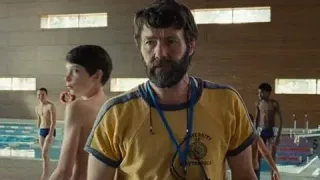July 22, 2015
35,000 Gallons of Oil Spills After Montana Train Derailment
Kilian Melloy READ TIME: 3 MIN.
Four tank cars leaked an estimated 35,000 gallons of oil after a train hauling fuel from North Dakota derailed in rural northeastern Montana, authorities said.
The spill marked the latest in a series of wrecks across the U.S. and Canada that have highlighted the safety risks of moving crude by rail.
No one was reported injured in the accident Thursday night that triggered the evacuation of about a dozen homes and a camp for oil field workers, according to state and local officials. It comes after recent oil train crashes, including a 2013 derailment in Quebec that exploded and killed 47 people.
The Burlington Northern Santa Fe Railway train was bound for Anacortes, Washington, when it derailed about 5 miles east of the small town of Culbertson, near the North Dakota border, officials said.
A hazardous-materials team contained the spill with earthen dams, and the oil didn't appear to affect any waterways, according to federal and state officials.
Unlike many prior oil train accidents, no explosions or fire were reported. The cars knocked over a power line as they left the tracks, and firefighters sprayed foam on the wreckage to prevent a fire as they worked to clean up the oil, according to Roosevelt County Chief Deputy Sheriff Corey Reum and BNSF spokesman Matt Jones.
"We're lucky it didn't ignite," Reum said.
In addition to the 2013 Quebec accident, in which much of the town of Lac-Megantic was incinerated, trains hauling crude from the Bakken region of North Dakota and Montana have been involved in fiery derailments in six states.
Acknowledging the risks, U.S. transportation officials have recently put rules in place intended to make shipping hazardous liquids safer. Critics, however, have said the rules don't do enough to keep cars on the tracks and prevent derailments.
Republicans in Congress have sought to roll back a provision that calls for an advanced breaking system. The rail industry says such an upgrade would be unnecessary and could cost billions of dollars. Federal officials want the new brakes installed right away and say delays would jeopardize safety.
There was no immediate explanation of what caused 22 cars to topple from the train in Thursday's wreck.
The train originated at a Savage Services loading terminal in Trenton, North Dakota, and had 106 cars loaded with crude, according to BNSF and state officials.
A BNSF hazardous materials team arrived at the scene at about 3:30 a.m. Friday, more than nine hours after the derailment, according to the Montana Department of Emergency Services. Reum said other railroad personnel had arrived in the first hours after the accident.
An evacuation order for people within a half-mile radius was lifted Friday morning. About 30 people living in the workers camp were kept out until the remaining oil was unloaded, Montana Department of Emergency Services spokesman Maj. Chris Lende said.
BNSF expected to re-open the line overnight after clearing the derailed cars Friday afternoon, Jones said.
Two days before the wreck, a BNSF train carrying a mixed cargo derailed about 20 miles away from Thursday's accident, damaging about a mile of track. There was no connection between the derailments, Jones said.
Officials could not say when the track was last inspected. Those records will be part of the Federal Railway Administration's investigation, Communications Director Matthew Lehner said.
Roosevelt County is situated along one of the main corridors for Bakken oil shipments bound for refineries on the West Coast. About 12 BNSF oil trains a week pass through the county, according to the company.
Under an April rule, oil being shipped from North Dakota must be treated to reduce the chances of an explosion. State and federal officials couldn't say whether Savage Services and the shipper of the oil in Thursday's accident, Statoil, had gone through that process.
Representatives of the companies did not immediately return messages seeking comment.
___
Volz reported from Helena. Associated Press writers Thomas Peipert in Denver and Bob Seavey in Phoenix contributed to this report.
___
This story has been updated to show that four tank cars leaked, based on new information from the Federal Railway Administration. Earlier versions had said three cars leaked.






